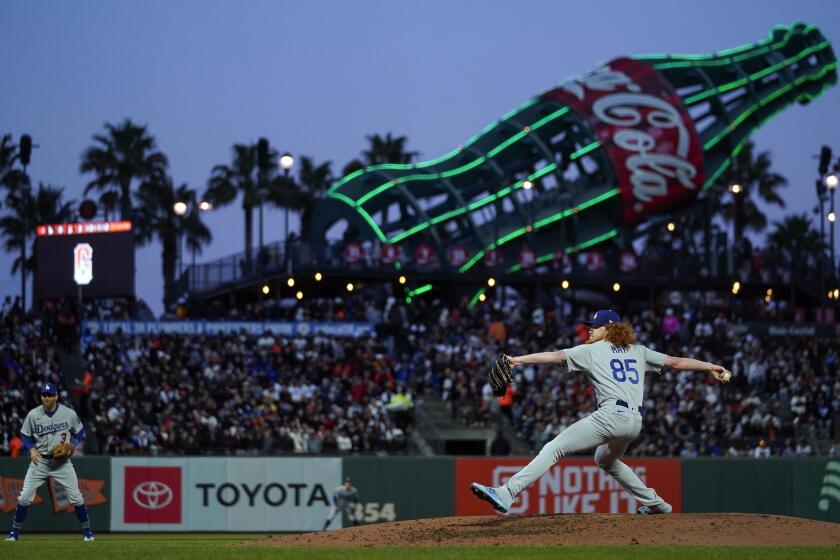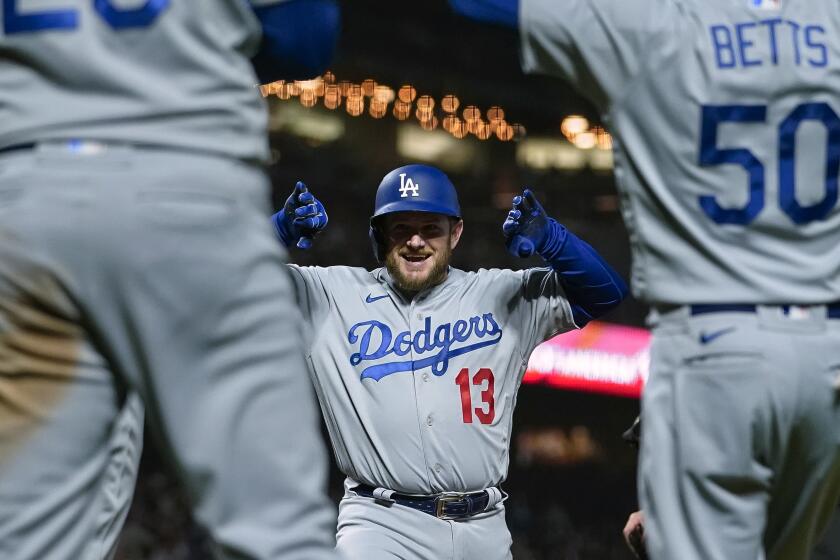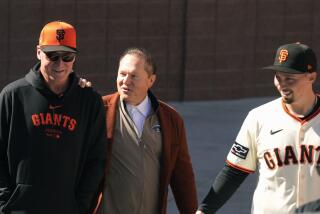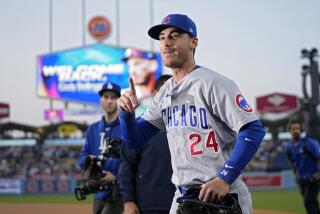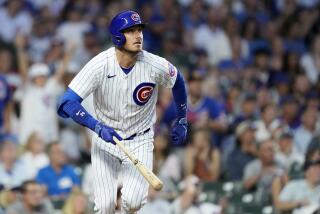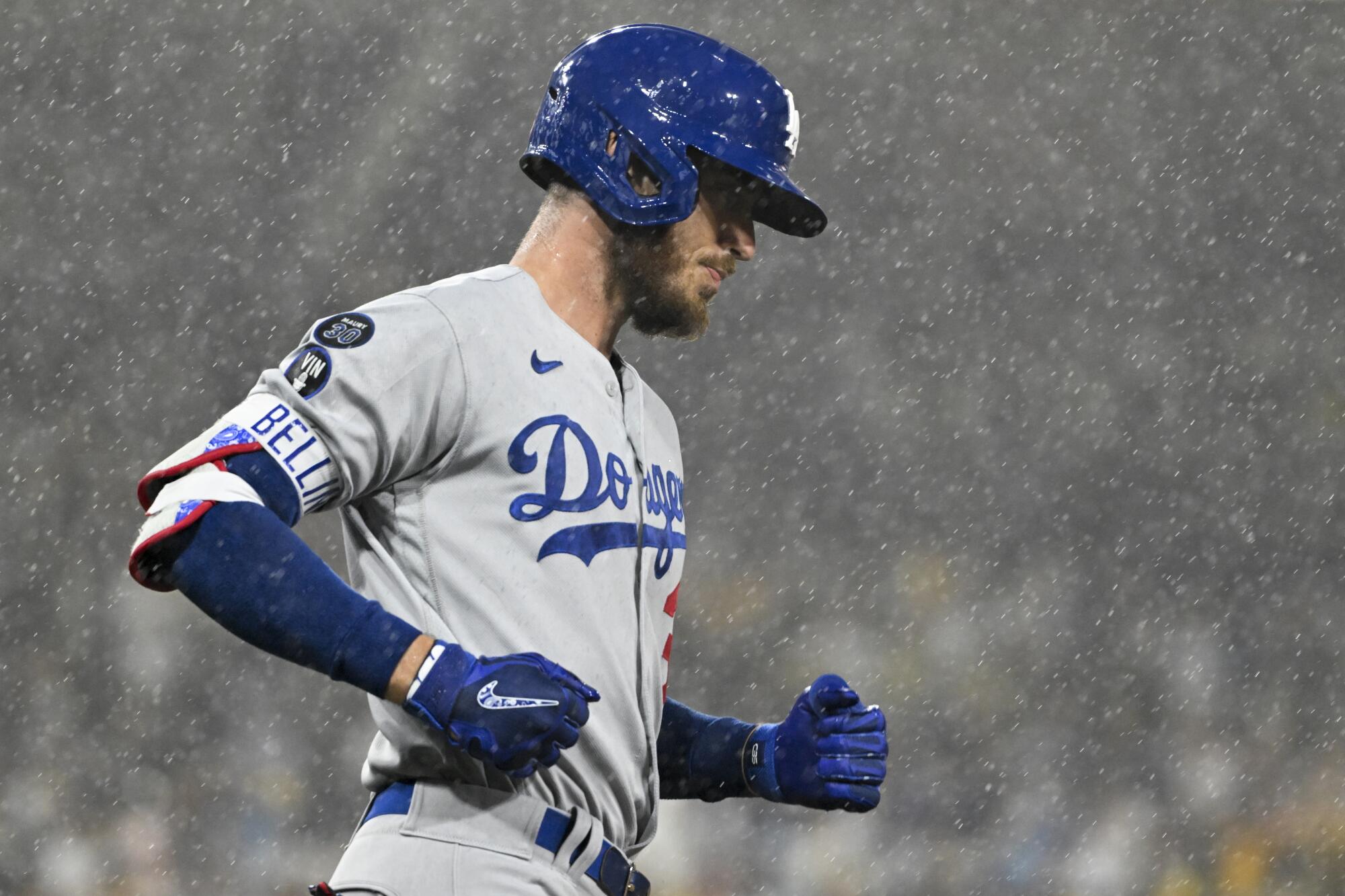
- Share via
There was a rapid rise, then a sudden descent.
An instant flash of talent, followed by a fizzle that left the baseball world scratching its head.
For his first three years in a Dodgers uniform, Cody Bellinger was one of the best stories in the majors. A homegrown prospect who blossomed as an MVP-winning superstar. A Chavez Ravine favorite among both the fanbase and the clubhouse.
Over his final three seasons with the club, however, Bellinger transformed into one of the sport’s biggest conundrums. An injury-plagued slugger struggling to hit for power. A once-feared presence who, amid a string of constant swing changes, was never able to rediscover his former self.
In their first series of the season, the boiling intensity between NL West rivals Dodgers and Giants has seemed to have been turned down to simmer.
“It’s one of the more dramatic swings that I’ve ever been a part of,” Dodgers president of baseball operations Andrew Friedman said.
“I wish we could have done more to support him and get some more consistency for him,” manager Dave Roberts added. “But sometimes you just don’t have any answers.”
For the first time since the Dodgers non-tendered him this offseason, Bellinger will return to Dodger Stadium with the Chicago Cubs this weekend.
People within the organization speak highly of the 27-year-old outfielder. Most continue to root from afar for his success.
“He’s a first-class guy and worker,” hitting coach Aaron Bates said. “I’m always wishing him the best.”
Yet, a certain awkwardness still surrounds the sides’ unceremonious split; lingering questions about why his sky-high expectations were never fully met.
Some blame the shoulder injury Bellinger sustained banging forearms with then-teammate Kiké Hernández in the 2020 playoffs, an ailment that dragged down his play for much of the next two years.
Others point to the behind-the-scenes endeavor to rectify his swing, well-intended efforts between Bellinger and the coaching staff that never produced a strong enough effect.
In the end, Bellinger’s time with the Dodgers left only a slew of unresolved emotions. And when he returns to Los Angeles this weekend, it will likely conjure wistful recollections, but also blameless regret.
“I know how much time and energy Belli put into it,” Friedman said. “But obviously, it didn’t click.”
To recount Bellinger’s decade-long journey through the Dodgers organization, it’s best to follow the history of his ever-evolving swing.
“He definitely tinkered a lot,” said Bates, a minor league instructor during Bellinger’s prospect days before joining the Dodgers’ major league staff in 2019. “[He was always] trying to find his feels.”
At first, that wasn’t a bad thing for the former fourth-round draft pick.
After struggling to hit for power as a lanky high school player, Bellinger made a change to his bat position while climbing the club’s farm system. He began tilting his barrel back toward the pitcher to add more torque to each swing. And before long, he blossomed into one of the best young sluggers in the club’s highly ranked pipeline.
“When he swings that bat,” Roberts said during Bellinger’s debut in 2017, when he hit 39 home runs to win National League rookie of the year, “something really exciting can happen.”
The 2018 season was more of a learning experience for Bellinger, when a drop-off in production forced him to accept a platoon role and reevaluate the state of his swing.
“It was a big hack in ‘17 and ‘18, he swung hard,” Bates recalled. “He kind of tempered it down in ‘19, made it more controlled.”
Indeed, Bellinger found an equilibrium early in 2019.
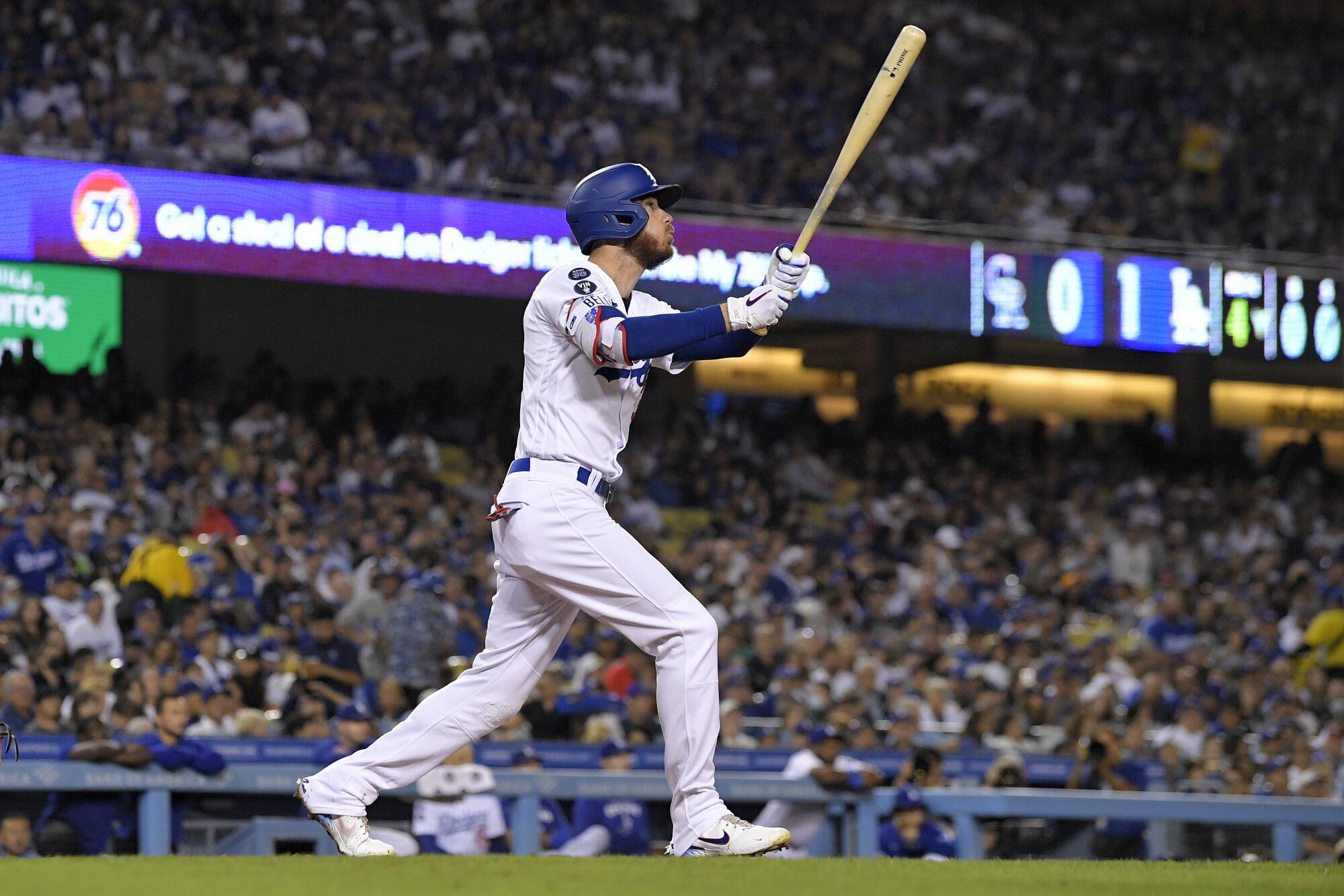
He clobbered a 400-foot home run on opening day. He matched an MLB record with 14 homers before the end of April. And he carried a .400 batting average through the middle of May.
“He was the best player in the league,” Bates said.
Yet, before long, Bellinger began toying with his swing once again.
After returning from the All-Star Game, the slugger experimented with an altered hand position, one Bates recalled was intended to squeeze even more power out of his 6-foot-4 frame.
It did help Bellinger close the season on a slugging tear, finishing the year with 47 home runs and a 1.035 on-base-plus-slugging percentage to wrap up the NL MVP award.
But other parts of his performance started to dip; a downward trajectory that was exacerbated by more swing changes during a career-worst performance (despite what Bates noted were decent underlying analytics) in the pandemic-shortened 2020 campaign.
“I don’t think he looks completely comfortable,” Roberts said during an extended slump for Bellinger early that season. “He’s still trying to figure things out.”
Freddie Freeman fouled off nine straight pitches during a 15-pitch at-bat that sparked a big 10-5 comeback win against the San Francisco Giants on Wednesday.
During the club’s World Series run that postseason, it appeared that Bellinger had.
He robbed Fernando Tatis Jr. of a homer in the NL Division Series, making a leaping catch at the wall that became a defining image of the Dodgers’ championship trek.
He had five RBIs during the team’s three-games-to-one NLCS comeback against the Atlanta Braves, none bigger than the towering solo homer that broke a seventh-inning tie in their Game 7 win.
For a brief moment that night, as he coolly flipped his bat and confidently nodded his head, it looked like the old Bellinger might be back. That his powerful swing and persistent confidence were synching up once again.
But then, upon returning to the dugout, he and Hernández celebrated with their infamous forearm bang.
Bellinger immediately felt his shoulder pop. He gingerly grabbed at it while grimacing in pain. He was able to finish out the team’s title run, starting all six games of their victorious World Series against the Tampa Bay Rays.
But less than a month later, he was forced to undergo arthroscopic labrum surgery.
“That right shoulder surgery,” Bates said, “he was never the same after that.”
Sixteen months removed from the Dodgers championship, co-hitting coaches Robert Van Scoyoc and Brant Brown held a rare scrum with reporters at the team’s Arizona spring training facility.
The start of the 2022 season was just days away. The Dodgers’ recent signing of Freddie Freeman cemented their lineup as one of the best in the majors.
And yet, for the better part of 10 minutes, the two coaches were peppered with questions about another former MVP — one whose career had drifted a far different direction.
After spending a full winter rehabilitating from his shoulder surgery, Bellinger was dealt another blow during the opening week of the 2021 season, suffering a hairline fracture in his left leg that kept him sidelined for almost two months.
While his absence disrupted his timing and rhythm, the bigger problem was the toll the successive injuries took on Bellinger’s physical strength.
Bellinger’s swing had always been based on bat speed and barrel control. He didn’t just attack with power, but had enough precision with the bat to drive pitches left over almost any part of the plate.
With a weakened front shoulder and ailing back leg, however, that potent combination was suddenly negated.
“His body wasn’t able to move in the same ways that it was before,” Friedman said. “That’s a hard thing to relearn.”
It showed in a dismal display during the 2021 season. Bellinger’s .165 batting average ranked second-lowest in the majors among hitters with 350 plate appearances. And after hitting just 10 home runs with a .542 OPS, Baseball Reference calculated his performance to be almost two wins worse than a replacement-level player.
When those struggles carried over to the spring of 2022, Bellinger tried again to tinker his mechanics. At one point during camp, his stance seemingly changed every couple days.
“It’s his swing, his career,” Van Scoyoc told reporters as spring training drew to an end. “We’ve got to be there to help and support him, even if you don’t necessarily think that’s the right thing at that moment.”
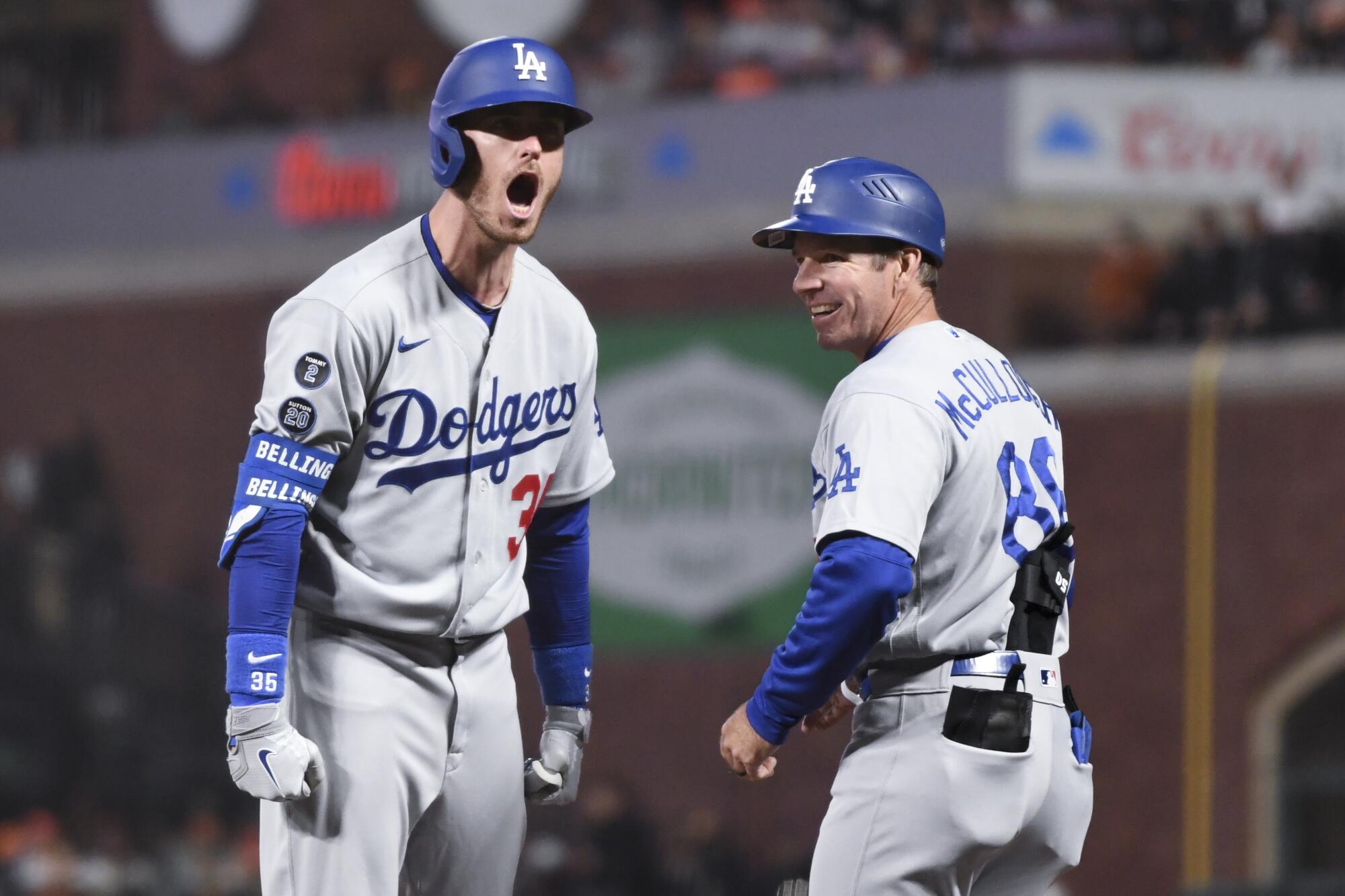
Thus was the challenge Bellinger and the Dodgers were facing.
Both were desperate to compensate for the lingering impact of his injuries. But Bellinger struggled to find a new swing he could comfortably embrace.
“I think he attacked the process with a really open mind, and with a strong desire to get back to those levels,” Friedman said. “But one thing we confronted a lot was, what we were striving for versus how it felt to him. Obviously, for hitters, feeling good with what you’re doing is really important. But a lot of the things we tried, he just didn’t feel right with, which then makes it hard to commit to, obviously.”
There was one potential turning point in the 2021 playoffs, when Bellinger dropped his hands, shortened his bat path and simply focused on staying in the strike zone, and putting balls in play.
For 12 games that October, the results were promising. He had the decisive ninth-inning hit in Game 5 of the NLDS against the San Francisco Giants. He added a mammoth three-run blast in Game 3 of the NLCS against the Braves.
Yet, like so many other iterations of his mechanics at the plate, Bellinger couldn’t stick to the changes permanently. The new motion was too different from his old one. And he eventually reverted to a similar version of his original, looping swing.
“It wasn’t necessarily a long-term solution,” Friedman said of Bellinger’s 2021 postseason mechanics. “I mean, it could have been. But again, it was figuring out what was comfortable and would work for him … especially with his body being different than it was before the injuries.”
After making only marginal improvements to his numbers last season, when he batted .210 with 150 strikeouts, Bellinger’s future with the Dodgers finally came to a head.
Rather than pay Bellinger the $18 million or more he would have earned through arbitration, the club made the unheard-of decision to non-tender the former face of its franchise.
“We would see that talent poke through at various times,” Friedman said. “But just the consistency of it was challenging.”
By all accounts, Bellinger’s body is in a much better state now.
That was a key selling point his agent, Scott Boras, made while negotiating the $17.5-million deal Bellinger signed with the Cubs as a free agent.
And while he’s still far off the heights of his Dodgers career, the outfielder has shown more incremental progress early this season, entering this weekend’s Los Angeles homecoming with a .238 average, two home runs and nine RBIs through his first 11 games.
“I don’t think it was a bad thing for him and his family, having a change of scenery,” Bates said. “Sometimes, that’s the way it goes with guys.”
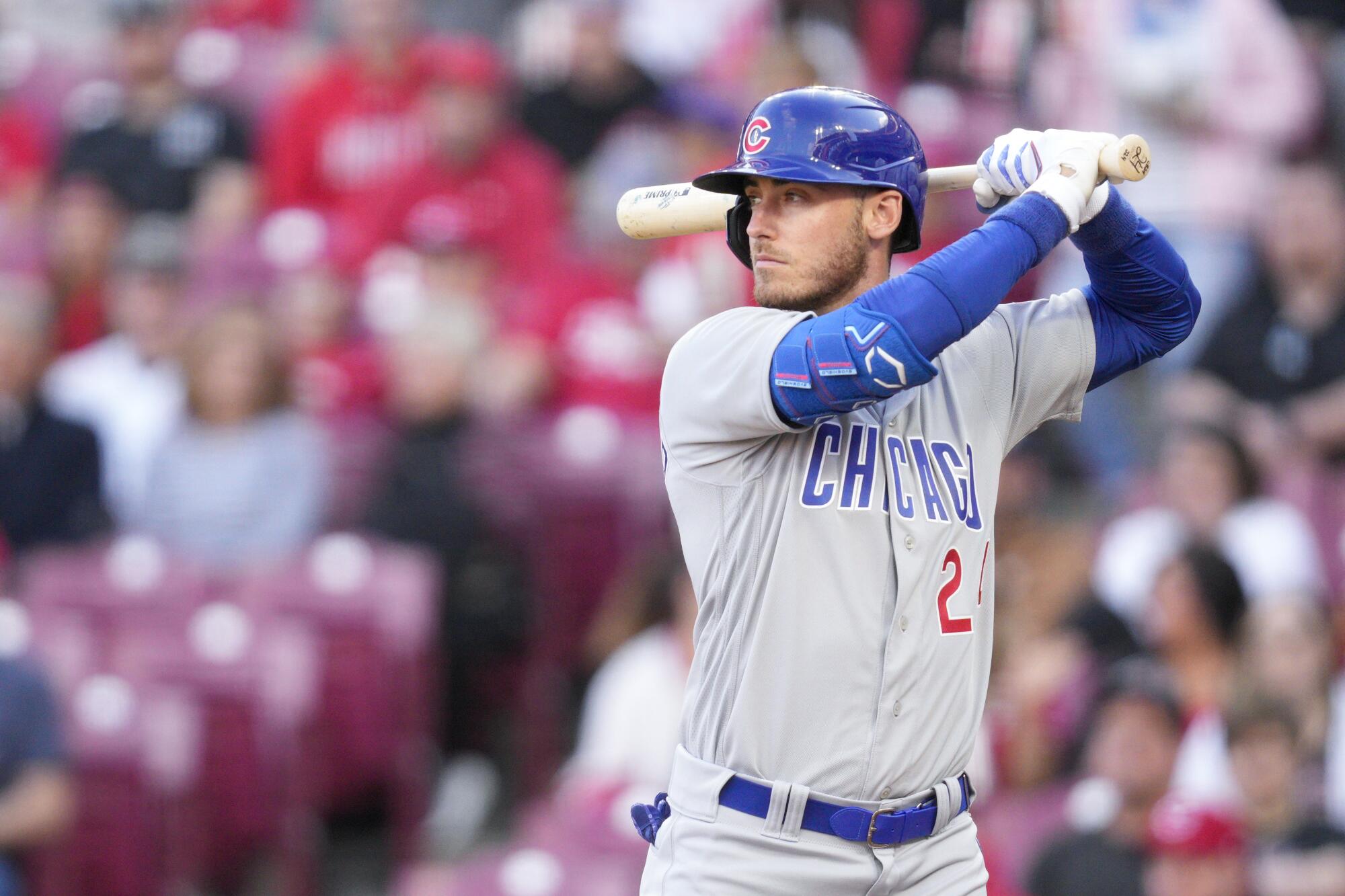
Still, no one would have expected Bellinger to ever need it, not after the way he shined with the Dodgers at the start of his career.
While Bellinger has sparingly discussed his L.A. legacy since being released over the offseason, those still with the organization view his impact on the club through a positive lens.
“He’s a great player, and meant a ton to our success along the way,” general manager Brandon Gomes said.
“Knowing how hard he worked and how much he cared, that’s really all we can ask for,” Friedman added. “So nothing but love and respect for Cody.”
For Roberts, the realization of Bellinger’s departure set in this spring, after facing him for the first time with the Cubs during a Cactus League game.
“It was different seeing him out in a Cubs uniform,” Roberts said that day, adding: “Our hope is that [he] will kind of tap into something that’s already in there, that we know. I’ll always root for Cody.”
Friedman echoed similar sentiments while discussing Bellinger this week, reflecting on a chapter of Dodgers history that will long be remembered for its electrifying climax, but also its unfulfilling end.
“Watching the effort that went into it, from Cody and our hitting guys, I feel good that all sides did everything they could to get him back on track,” Friedman said. “We just couldn’t get there.”

